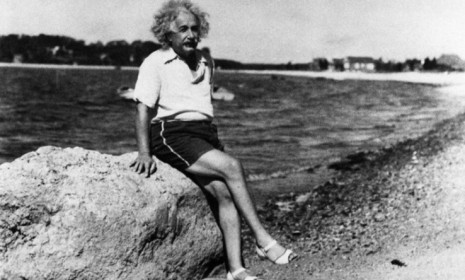Einstein's personal papers: 6 'human' revelations
An expanded online archive sheds light on the renowned genius — who knew he'd applied his mind to the problem of achieving peace between Jews and Arabs?

A free daily email with the biggest news stories of the day – and the best features from TheWeek.com
You are now subscribed
Your newsletter sign-up was successful
In honor of Albert Einstein's 133rd birthday, Israel's Hebrew University announced that it had added 2,000 newly digitized documents from the physicist's collection to its online portal. From an original handwritten draft of the Theory of Relativity (including its famous equation E=MC2) to personal letters, the collection gives a more "coherent picture" of a human being "who, more than anyone else in the first half of the 20th century, expressed his views on everything on the agenda of mankind," says Hanoch Gutfreund, the head curator of Einstein's intellectual property. And there's more to come — the university will eventually digitize all 80,000 documents in its possession. Here, six revelations about Einstein:
1. Einstein was an excellent student
Popular myth holds that Einstein was a bit of a dunce at school, a kind of mental Ugly Duckling who flowered intellectually later in life. Not so, the archives show. He was a sharp student, but bristled under the strict discipline of his teachers.
The Week
Escape your echo chamber. Get the facts behind the news, plus analysis from multiple perspectives.

Sign up for The Week's Free Newsletters
From our morning news briefing to a weekly Good News Newsletter, get the best of The Week delivered directly to your inbox.
From our morning news briefing to a weekly Good News Newsletter, get the best of The Week delivered directly to your inbox.
2. Einstein loved his mother way more than science
Upon learning of an experiment affirming that light could be bent — proving his Theory of Relativity — Einstein dashed off a postcard to his ailing mother. "Good news," he wrote. "British expeditions have definitively confirmed the deflection of light by the Sun. Unfortunately, Maja has written me that you're not only in a lot of pain but that you also have gloomy thoughts. How I would like to keep you company again so that you're not left to ugly brooding."
3. Fans fixated on his wild hair
The scientist's wire-y bouffant is a recurring theme in the correspondence he received. A letter from a 6-year-old reads, "I saw your picture in the paper. I think you ought to have a haircut." An older fan wrote, "I'm making a scientific survey to determine why genius so often tends to long hair."
A free daily email with the biggest news stories of the day – and the best features from TheWeek.com
4. Einstein had a strong Jewish identity before the Nazi era
Historians have speculated that the scientist embraced his Jewish roots largely in response to Hitler's rise in Einstein's native Germany. But letters show that he was deeply involved in fighting bigotry before Hitler came to power, deploring Germany's policy of denying university entrance to eastern European Jews. When accused of being disloyal to his country, he responded, "I do still always feel obliged to speak up for my persecuted and morally oppressed fellow clansmen… this involves an act of loyalty far more than one of disloyalty."
5. Einstein saved an old flame from the Nazis
Betty Neuman, Einstein's former mistress, wrote him 15 years after their affair to see if he could arrange her passage to America. "Einstein obliged, penning an affidavit that helped save her from the Nazis," says Karl Vick at Time.
6. Einstein wanted peace between Arabs and Jews
After religious violence left 67 Jews dead in 1929 Hebron, Einstein wrote a letter to the Falastin newspaper suggesting how Jews and Arabs could make peace. (This was nearly 20 years before Israel even existed as a nation-state.) Einstein proposed what is arguably not his most genius idea: A council of eight wise men, split evenly between Jews and Arabs, that would resolve quarrels.
Sources: Bloomberg Businessweek, Fox News, Space.com, TIME
-
 Political cartoons for February 15
Political cartoons for February 15Cartoons Sunday's political cartoons include political ventriloquism, Europe in the middle, and more
-
 The broken water companies failing England and Wales
The broken water companies failing England and WalesExplainer With rising bills, deteriorating river health and a lack of investment, regulators face an uphill battle to stabilise the industry
-
 A thrilling foodie city in northern Japan
A thrilling foodie city in northern JapanThe Week Recommends The food scene here is ‘unspoilt’ and ‘fun’